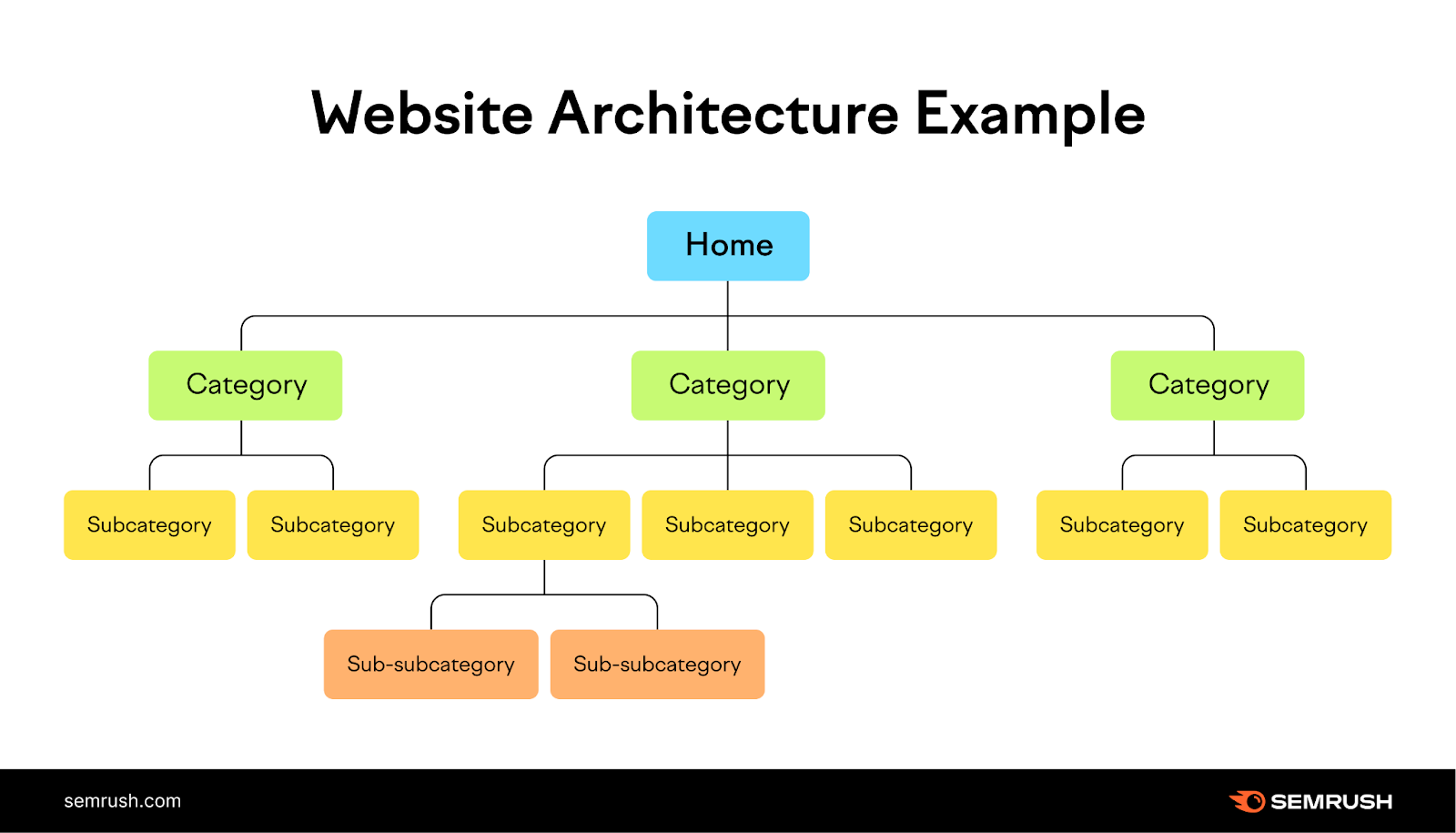Mobile-First Website Design 101


In digital marketing, search engine optimization (SEO) remains critical for driving organic traffic to your website.
Content and backlinks often steal the limelight, but technical SEO is the backbone of your website's ability to be discovered and ranked by search engines. Our comprehensive guide to technical SEO services covers everything you need to know. We delve into technical SEO, its key components, why it's essential, and how to find the right technical SEO help for your website.
There are three main elements of search engine optimization:
Some basic tenets of technical SEO setup include sitemaps that you submit to the search engines. But technical SEO includes everything search engines consider when ranking your site, including user experience, security, and anything else that makes your website’s content a good result for searchers. Keep in mind that search engines want their users to have a good experience using search, so the better your site's user experience, the better you’ll rank in their search results.
Here are the key elements to consider when doing your technical SEO setup or utilizing technical SEO services, whether you do it yourself or through an agency or web developer.
A well-structured site is more navigable by humans, and the crawlers will likely index the pages. Site structure should have a logical hierarchy, clear categories, consistency, and functionality that suits the searcher and the search engine. Using a clear architecture also makes orphan pages (i.e., pages with no incoming links) less likely, ensuring every page gets crawled and indexed.

An XML sitemap is a list of all the pages on your website and where to find them. It's generally found at yourdomain.com/sitemap.xml and serves as a handy guide for search engines on where all the pages they need to crawl and index are. You can see ours at peakdigitalstudio.com/sitemap.xml
Like the sitemap, your robots.txt is a file that lets search engines know which pages they can and cannot crawl. For example, there might be internal pages you want to avoid showing up in search results. This should be set up at yourdomain.com/robots.txt
Your web developer should be setting these pages up when developing your website (more on that later).
SEO-friendly URLs mainly include descriptive keywords, are consistent, and lack unnecessary parameters. These well-structured URL practices enhance user experience and your search rankings. So, for example, your blog posts should be yourdomain.com/blog/technical-seo-services, rather than random strings of numbers.
With Google's mobile-first indexing, a mobile-friendly site is an absolute must. Responsive design and accelerated mobile pages ensure that your site will run optimally, no matter what, from desktop computers to phones, which means it will be ranked higher.
Page load times notably impact user experience, and thus SEO. Make sure pages load fast for your users.
HTTPS is a ranking factor and one of the trust signals provided to the user. Applying SSL certificates guarantees a secure communication channel between your site and visitors, boosting your SEO juice.
If crawlers come across many broken pages, it will negatively impact SEO. Update or remove broken links and ensure users aren't landing on 404 pages.
If you need technical SEO assistance, there are several services available. Whether you choose to do it yourself, work with a website developer, or hire an SEO agency, we'll help you understand the pros and cons of each option.
If you're tech-savvy enough, using your technical SEO services is an option. Several SEO software tools/platforms run regular technical SEO audits to check for all the issues we outlined above.
At Peak Digital Studio, we use Ahrefs, which conducts weekly audits on our site and clients and identifies any issues that need fixing. Several other SEO tools provide a similar service, including SEMRush.
These tools are great because they are relatively inexpensive and give clear steps you can take to fix any technical SEO issues you have.
The primary drawback comes when you don’t have the time, energy, or technical expertise to make the changes required to your site. Also, it’s another software subscription you’ll have to pay monthly - Ahrefs, which is $129 p/m for the cheapest plan.
A good web developer will consider the technical SEO side of things when they design, architect, and develop your site. Here at Peak, we consider site structure and do all the technical setup required, such as submitting sitemaps, setting clients up on Google Search Console, and more. As mentioned, we run monthly SEO audits with Ahrefs for our clients and fix any issues that might arise, such as broken or orphaned pages.
When hiring a web developer, ask them about technical SEO setup. Use this article to grill them on specifics of technical SEO to ensure they know what they’re talking about!
Doing your technical SEO setup right off the bat when building your new website is the way to go! You can also have a website developer fix any existing SEO issues.
The benefit of your technical SEO being done initially by your web developer is you never have to go back and redo portions of the site to be more SEO-friendly. You get the SEO benefit right out of the box. The only drawback is your web developer might not be SEO-focused (so ensure they are before hiring them).
You can also hire an agency that deals specifically in SEO to help you with the technical setup and the other critical pillars of search engine optimization, such as content and backlink building.
The pros of this are you can outsource to an expert who will take the hard work of SEO off your plate. The drawback is the price.
Boosting your website's performance with technical SEO is a game-changer for visibility and organic traffic. Focusing on elements like site architecture, XML sitemaps, robots.txt, URL structure, mobile optimization, website speed, HTTPS, and fixing broken pages can make a huge difference.
Whether you tackle technical SEO independently, work with a web developer, or hire an SEO agency, knowing these basics is critical. Implementing these strategies helps create a user-friendly, search engine-friendly site that attracts more visitors. Make technical SEO a priority, and watch your website grow!
Technical SEO refers to the optimization of a website's infrastructure to ensure that search engines can crawl, index, and render it efficiently. This includes improving the site's speed, ensuring mobile-friendliness, enhancing site architecture, and implementing proper URL structures.
An SSL certificate can resolve the technical SEO issue of site security. Having HTTPS instead of HTTP is a ranking factor for Google and ensures that data transmitted between the user and the website is encrypted and secure.
To conduct a technical SEO site audit, follow these steps:
A technical SEO audit is an evaluation process where you analyze the technical aspects of a website to ensure it meets search engine guidelines. This includes checking site speed, mobile usability, security, and other elements that affect crawlability and indexation.
To do technical SEO:
Technical SEO is crucial because it ensures that your website is accessible and understandable to search engines. Without proper technical optimization, search engines may struggle to crawl and index your site, leading to poor rankings and reduced visibility.
Technical SEO includes:
To choose the right technical SEO agency:
The most important technical SEO issues include:
Performing a technical SEO audit is essential to identify and resolve issues that may hinder your website’s performance in search engines. Regular audits help maintain and improve site health, ensuring better rankings and user experience.
To learn technical SEO:
Technical SEO refers to the practices that optimize a website's infrastructure to enhance its visibility and performance in search engines. This includes improving site speed, ensuring mobile-friendliness, securing the site, and fixing technical issues that could impact crawlability and indexation.
In digital marketing, technical SEO focuses on improving the technical aspects of a website to enhance its search engine performance. This involves optimizing server performance, ensuring proper site architecture, and using SEO tools to identify and fix technical issues.
You should ask for a technical SEO audit to identify any underlying issues that could be preventing your website from ranking well in search engines. An audit provides a comprehensive analysis of your site's technical health and offers actionable recommendations to improve its performance.
To improve technical SEO:
To fix technical SEO issues:
Technical SEO is critical to a site's performance as it ensures that search engines can effectively crawl, index, and rank the site. Proper technical SEO improves site speed, usability, and overall user experience, leading to better search engine rankings and more traffic.
A technical SEO audit is important because it identifies and resolves issues that could be negatively impacting your site's search engine performance. Regular audits ensure that your website remains optimized for search engines, leading to better visibility and higher rankings.
Focus on the following technical SEO elements:
Top technical SEO agencies provide services such as:
The cost of a full technical SEO audit can vary widely depending on the size and complexity of your site. On average, prices range from 500 to 5,000. Some agencies might charge more for extensive audits or additional services.
To work effectively with a technical SEO agency:
To get started with technical SEO:
A technical SEO specialist focuses on the technical aspects of SEO, such as site speed, mobile usability, crawlability, and structured data. They use specialized tools and techniques to ensure that a website meets search engine guidelines and performs well in search results.